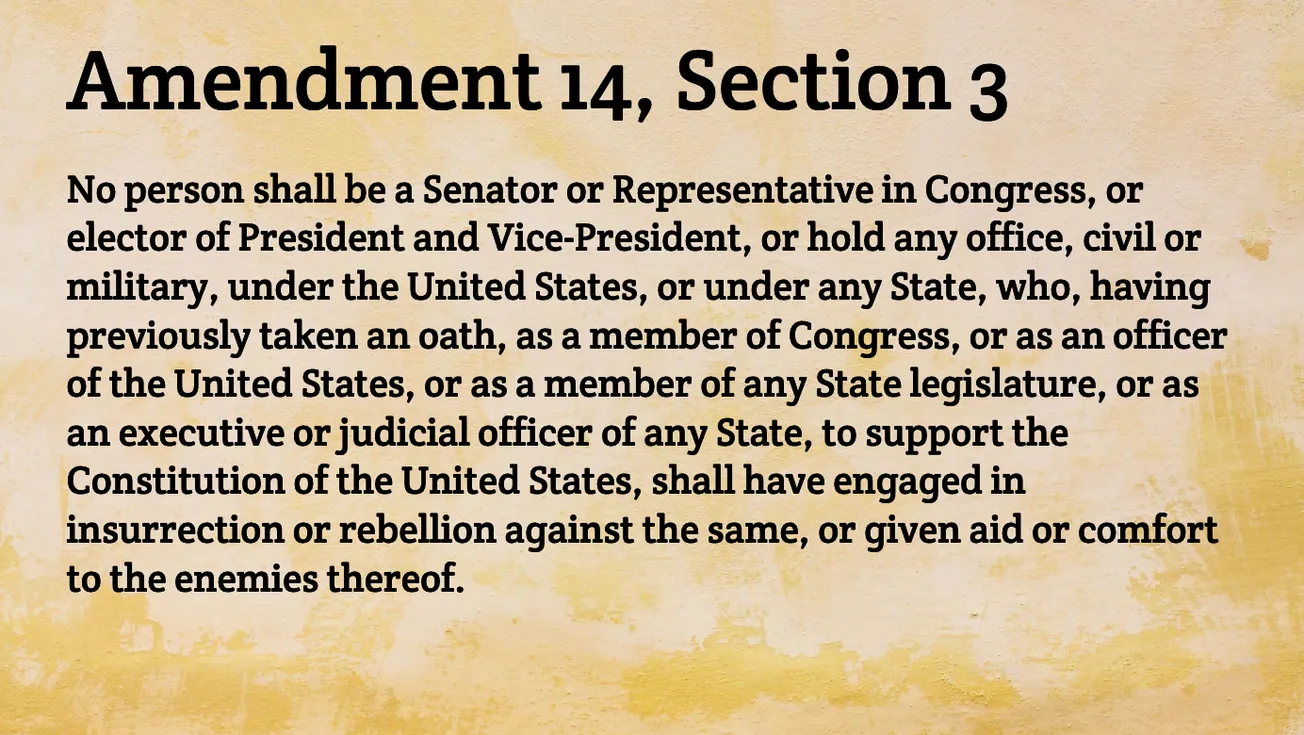Nobody is more devoted to Donald Trump and the GOP than conservative white southern menfolk who worship their Confederate forebears.
Time was, Republicans roundly condemned Confederates as traitors. So when GOP lawmakers drafted the 14thAmendment in 1866, they added a provision barring ex-rebels from government or military service. Last month, Rep. David N. Cicilline of Rhode Island and 40 fellow Democrats proposed legislation to apply that proscription to Trump.
“It is a totally different Republican Party and a totally different Democratic Party today,” said Murray State University historian Brian Clardy.
Cicilline’s measure lapsed when the old Congress adjourned. While the GOP holds a slim House majority in the new Congress, presumably he could reintroduce his bill.
Even so, Clardy doubts any such legislation will land on President Biden’s desk. “The only way it could pass would be if there were enough Republicans in the House willing to cross the Freedom Caucus and Trump. I don't see that happening.”
Ratified in 1868, the 14th Amendment made Blacks citizens. It was one of a trio of amendments added to the Constitution during the Reconstruction era: the 13th outlawed slavery, and the 15th extended the franchise to Black men.
President Andrew Johnson (ultimately impeached) and the Democrats bitterly opposed all three amendments. Before the war, the Democratic Party, whose base was the slave-state South, was the pro-slavery party. Southern Democrats had played key roles in founding the Confederacy on the twin pillars of slavery and white supremacy.
Many high-ranking rebel military and political leaders had served in the U.S. army or Congress before America’s most lethal conflict. Their oath of office included a pledge to uphold the Constitution. Hence, the 14th Amendment’s Section 3 stipulated that nobody who took the oath and “engaged in insurrection or rebellion against” the Union or gave “aid or comfort to the enemies thereof” could hold government or military office.
The drafters of the 14th Amendment “intended it to serve as an aggressive response to the existential threat to the Republic posed by the losing side of the Civil War,” The New York Times’s Jesse Wegman wrote. “Section 3 was Congress’s way of ensuring that unrepentant former Confederate officials — ‘enemies to the Union' — were not allowed to hold federal or state office again.”
The Republicans eventually allowed former Confederates back in Congress. They also gave up on Reconstruction in 1877 and looked the other way while the old Confederate states, dominated by Democrats — many of whom had been Confederate military officers or government officials — subverted the 14th and 15th amendments by passing Jim Crow laws segregating Blacks and denying them the vote.
The Jim Crow Era lasted until the 1960s when northern and western Democrats — and President Lyndon Johnson, a Texan — championed landmark civil rights legislation hailed as a second Reconstruction. In the decades that followed, the GOP became what the Democrats once had been: the white folks’ party.
Since 1970, wrote historian Heather Cox Richardson, “Republicans have relied on racism and sexism to rally voters with the argument that Black and Brown voters and feminist women — ‘feminazis,’ in radio host Rush Limbaugh’s world — wanted big government so it would give them handouts.
“It was a political equation that worked with a wink and a nod until former president Trump put the racism and sexism openly on the table and encouraged his supporters to turn against their opponents. They have now embraced open white supremacy.”
Even before Trump announced his candidacy in 2015, journalist Harold Meyerson wrote in The Washington Post that “fueled by the mega-donations of the mega-rich, today’s Republican Party is not just far from being the party of Lincoln: It’s really the party of Jefferson Davis. It suppresses black voting; it opposes federal efforts to mitigate poverty; it objects to federal investment in infrastructure and education just as the antebellum South opposed internal improvements and rejected public education; it scorns compromise. It is nearly all white. It is the lineal descendant of Lee’s army, and the descendants of Grant’s have yet to subdue it.”
Cicillini’s bill was squarely aimed at denying Trump a 2024 presidential bid. “Donald Trump very clearly engaged in an insurrection on January 6, 2021 with the intention of overturning the lawful and fair results of the 2020 election,” the congressman said in a news release. “You don’t get to lead a government you tried to destroy.”
Republicans made the same case against the ex-Confederates for rebelling against the lawfully-constituted national government. The Civil War — officially “the War of the Rebellion” — caused the deaths of 364,511 U.S. servicemen (110,100 died in battle; the rest succumbed to disease and other service-related causes.)
Clardy said Cicilline’s measure is on firm constitutional ground. “There’s no question that Donald Trump took part in an insurrection against the government and people of the United States on Jan. 6,” he said. “The evidence is prima facie.”
Like Clardy, Wegman believes “the ideal way for Trump to be banished for good would be via the voters.” He agrees the House Democratic impeachment managers provided ample evidence to depose Trump. “Had the Senate convicted him as it should have, he could have been disqualified from holding public office again. But nearly all Senate Republicans came to his defense, leaving him free to run another day.”
Yet Wegman concluded that “Jan. 6 showed the world Mr. Trump poses a unique and profound threat to the Republic: He is an authoritarian who disregards the Constitution and the rule of law and who delights in abusing his power to harm his perceived opponents and benefit himself, his family, and his friends.”
Hence Wegman, like Clardy, is “open to using any constitutional means of preventing him from even attempting to return to the White House.”
With impeachment off the table and a 14th Amendment ban unlikely when the new House is seated, Trump’s fate hinges on what Attorney Gen. Merrick Garland and the Justice Department decide to do with him, Clardy said.
“If the evidence is there and the Justice Department doesn’t prosecute Trump, what would that say to a future president?” the historian asked. “If nothing happens to Trump for what he did, future presidents could decide that they are free to summon the mob if they don’t get their way. Future presidents will feel that they can do anything with impunity.
“If the Justice Department doesn’t act, it would set a very, very dangerous precedent.”
--30--








